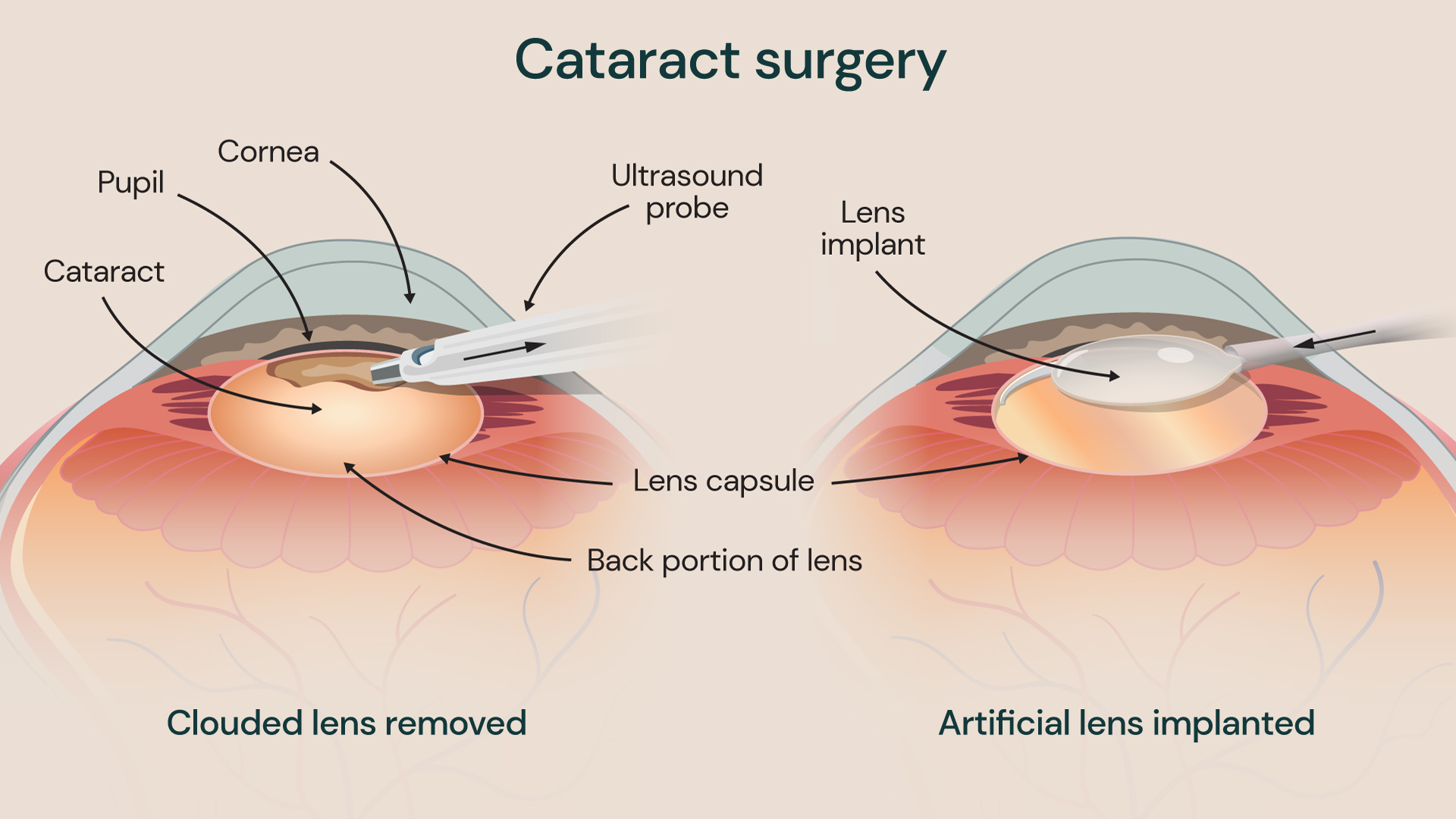What is cataract surgery?
Cataracts occur when changes in the lens of the eye cause it to become less clear, resulting in cloudy or misty vision. The development of cataracts is a normal part of the ageing process, so everyone develops a degree of cataract as they get older.
At Guy’s and St Thomas’ Specialist Care, we provide a variety of specialist cataract treatments to improve and restore your vision back to its best.
Preparing for cataract surgery
Cataract surgery is normally performed as day surgery under local anaesthetic. This means you are awake but will not feel any pain.
You will not be able to see properly during the operation however, you may notice bright lights or colours. You will need to lie relatively still during the surgery; if you need to adjust your position you can tell your consultant and they can pause the procedure.
Cataracts treatment
Treatment for cataracts will normally involve the removal of the lens in your eye (which has developed the cataract) and replacing it with an artificial lens.
This will usually be carried out with phacoemulsification surgery which uses an ultrasound device to remove your cataract. This modern procedure emulsifies the inside of the lens of your eye (breaks it into small pieces) with the help of ultrasonic waves. Afterwards, the emulsified lens will be suctioned out and removed from your eye.
An intraocular lens implant, which is usually made of acrylic, will then be inserted into your lens capsule (the thin membrane on the outside of your natural lens that will hold the artificial lens in place). This artificial lens will help to restore your vision.
Phacoemulsification surgery is minimally invasive. It only requires a very small incision and usually no stitches are needed. Your vision will be cloudy for a short time afterwards but, as you recover, it will become clearer again.
Refractive lens exchange surgery (RLE)
RLE, sometimes known as lens replacement surgery, replaces your clouded lens with a synthetic intraocular lens implant and is traditionally performed in the same way as phacoemulsification cataract surgery – but with one key difference.
The main goal of RLE is to reduce your need for contact lenses or glasses, not just to replace a clouded lens. For this reason, it can be used to improve visionary issues like short-sightedness, long-sightedness and astigmatism.
The other difference with RLE is the artificial lens implanted into your eye will act as glasses or contact lenses. RLE is recommended for those over 50 who have a glasses prescription higher than the normal standard range suitable for laser eye surgery. Sometimes, RLE can improve your vision enough that you no longer need to rely on glasses or contact lenses.
There are different types of lenses used in this procedure depending on your condition:
- monofocal lenses – also known as standard lenses, these reduce the need for glasses to see things at a distance
- multifocal lenses – these enhance your immediate and near vision. These are only suitable if you have no other eye problems (such as glaucoma or retinal disease)
- extended depth of focus lenses – these are more modern lenses that can give distance, intermediate and some near vision without compromising on the contrast sensitivity
- toric lenses – these lenses correct the shape of the eye by customising the power of the new lens in the 2 different meridians to further improve the quality of vision
Private patients who visit our ophthalmology department at St Thomas’ Hospital for their cataract surgery have the option to choose RLE when booking their cataract surgery.

Cataract treatment involves surgically replacing a clouded lens with an artificial one
Benefits of cataract surgery
Cataract treatment has advanced significantly since the first cataract removal procedure was completed in 1747. The first intraocular lens was implanted at St Thomas’ Hospital by Sir Harold Ridley in 1950.
Currently, there are no eye drops or medicines available that have been proven to effectively treat cataracts or slow down the process. Therefore, cataract surgery is a patient’s only option to help treat symptoms and improve their vision.
Risks of cataract surgery
Cataract surgery is usually very successful, with more than 95 out of 100 of people noticing an improvement in their vision after surgery, if they have no other pre-existing eye conditions.
However, as with any surgery, there are some risks associated with cataract surgery. Some of the complications that may occur during the operation include:
- incomplete removal of the cataract
- part of the cataract falling into the back of the eye
- damage to other structures of the eye
- in rare cases internal bleeding
Some of these complications can be dealt with at the time of the surgery or just after surgery.
Potential complications occurring after the operation include:
- focus of the eye after surgery not as expected
- clouding of the membrane behind the lens
- fluid accumulating in the retina
- severe infection
- detachment of the retina
These complications can sometimes occur even if the operation itself is carried out perfectly. Many of these complications are manageable, although it can mean that other treatments may be required and that the recovery period may be longer than usual.
The most serious consequence of all the complications is the risk of loss of vision but this is very rare. The chance of severe or complete permanent loss of vision in the operated eye is less than 1 in 1,000.
If you have any questions or concerns about the procedure please discuss these with your consultant.
Book an appointment with Guy’s and St Thomas’ Specialist Care
Cataract surgery is an effective treatment and can enhance your vision. Depending on which type of surgery you undergo, you may also be able to reduce or eliminate your need for glasses or contact lenses.
At Guy’s and St Thomas’ Specialist Care, we offer cataract surgery by dedicated specialists to support and protect your vision. Our ophthalmology team consists of world-class consultants who will provide you with unparalleled service and care.
If you are struggling with cataracts or problems with your vision, book a consultation with us at Guy’s and St Thomas’ Specialist Care. Our dedicated team will help you book an appointment that’s convenient for you and get your vision back on the right track.
Related services
-
Blepharoplasty (eye lift) eyelid surgery
Eyelid surgery (blepharoplasty) includes a range of treatments for eye conditions such as excess skin, droopy eyelids and benign lesion or cysts.
-
Glaucoma surgery (trabeculectomy)
Trabeculectomy is a type of surgery used to treat glaucoma.
-
Retinal detachment surgery (vitrectomy)
Vitrectomy is a surgical procedure used to repair retinal detachment.
Locations
Our ophthalmology specialists treat patients at the following locations
Meet our ophthalmology team
Our team of ophthalmologists offer a wide range of interventions, from common outpatient procedures to highly complex operations requiring specialist facilities.
